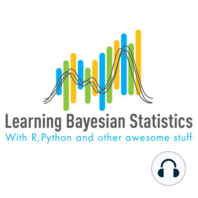44 min listen

#33 Bayesian Structural Time Series, with Ben Zweig
#33 Bayesian Structural Time Series, with Ben Zweig
ratings:
Length:
58 minutes
Released:
Feb 12, 2021
Format:
Podcast episode
Description
How do people choose their career? How do they change jobs? How do they even change careers? These are important questions that we don’t have great answers to. But structured data about the dynamics of labor markets are starting to emerge, and that’s what Ben Zweig is modeling at Revelio Labs.
An economist and data scientist, Ben is indeed the CEO of Revelio Labs, a data science company analyzing raw labor data contained in resumes, online profiles and job postings. In this episode, he’ll tell us about the Bayesian structural time series model they built to estimate inflows and outflows from companies, using LinkedIn data — a very challenging but fascinating endeavor, as you’ll hear!
As a lot of people, Ben has always used more traditional statistical models but had been intrigued by Bayesian methods for a long time. When they started working on this Bayesian time series model though, he had to learn a bunch of new methods really quickly. I think you’ll find interesting to hear how it went…
Ben also teaches data science and econometrics at the NYU Stern school of business, so he’ll reflect on his experience teaching Bayesian methods to economics students. Prior to that, Ben did a PhD in economics at the City University of New York, and has done research in occupational transformation and social mobility.
Our theme music is « Good Bayesian », by Baba Brinkman (feat MC Lars and Mega Ran). Check out his awesome work at https://bababrinkman.com/ (https://bababrinkman.com/) !
Thank you to my Patrons for making this episode possible!
Yusuke Saito, Avi Bryant, Ero Carrera, Brian Huey, Giuliano Cruz, Tim Gasser, James Wade, Tradd Salvo, Adam Bartonicek, William Benton, Alan O'Donnell, Mark Ormsby, Demetri Pananos, James Ahloy, Jon Berezowski, Robin Taylor, Thomas Wiecki, Chad Scherrer, Vincent Arel-Bundock, Nathaniel Neitzke, Zwelithini Tunyiswa, Elea McDonnell Feit, Bertrand Wilden, James Thompson, Stephen Oates, Gian Luca Di Tanna, Jack Wells, Matthew Maldonado, Ian Costley, Ally Salim, Larry Gill, Joshua Duncan, Ian Moran, Paul Oreto, Colin Caprani, George Ho, Colin Carroll, Nathaniel Burbank, Michael Osthege and Rémi Louf.
Visit https://www.patreon.com/learnbayesstats (https://www.patreon.com/learnbayesstats) to unlock exclusive Bayesian swag ;)
Links from the show:
Ben's bio: https://www.stern.nyu.edu/faculty/bio/benjamin-zweig (https://www.stern.nyu.edu/faculty/bio/benjamin-zweig)
Revelio Labs blog: https://www.reveliolabs.com/blog/ (https://www.reveliolabs.com/blog/)
Predicting the Present with Bayesian Structural Time Series: https://people.ischool.berkeley.edu/~hal/Papers/2013/pred-present-with-bsts.pdf (https://people.ischool.berkeley.edu/~hal/Papers/2013/pred-present-with-bsts.pdf)
A Hierarchical Framework for CorrectingUnder-Reporting in Count Data: https://arxiv.org/pdf/1809.00544.pdf (https://arxiv.org/pdf/1809.00544.pdf)
TensorFlow Probability module for Bayesian structural time series models: https://www.tensorflow.org/probability/api_docs/python/tfp/sts/ (https://www.tensorflow.org/probability/api_docs/python/tfp/sts/)
Fitting Bayesian structural time series with the bsts R package: https://www.unofficialgoogledatascience.com/2017/07/fitting-bayesian-structural-time-series.html (https://www.unofficialgoogledatascience.com/2017/07/fitting-bayesian-structural-time-series.html)
CausalImpact, an R package for causal inference using Bayesian structural time-series models: https://cran.r-project.org/web/packages/CausalImpact/vignettes/CausalImpact.html (https://cran.r-project.org/web/packages/CausalImpact/vignettes/CausalImpact.html)
This podcast uses the following third-party services for analysis:
Podcorn - https://podcorn.com/privacy
An economist and data scientist, Ben is indeed the CEO of Revelio Labs, a data science company analyzing raw labor data contained in resumes, online profiles and job postings. In this episode, he’ll tell us about the Bayesian structural time series model they built to estimate inflows and outflows from companies, using LinkedIn data — a very challenging but fascinating endeavor, as you’ll hear!
As a lot of people, Ben has always used more traditional statistical models but had been intrigued by Bayesian methods for a long time. When they started working on this Bayesian time series model though, he had to learn a bunch of new methods really quickly. I think you’ll find interesting to hear how it went…
Ben also teaches data science and econometrics at the NYU Stern school of business, so he’ll reflect on his experience teaching Bayesian methods to economics students. Prior to that, Ben did a PhD in economics at the City University of New York, and has done research in occupational transformation and social mobility.
Our theme music is « Good Bayesian », by Baba Brinkman (feat MC Lars and Mega Ran). Check out his awesome work at https://bababrinkman.com/ (https://bababrinkman.com/) !
Thank you to my Patrons for making this episode possible!
Yusuke Saito, Avi Bryant, Ero Carrera, Brian Huey, Giuliano Cruz, Tim Gasser, James Wade, Tradd Salvo, Adam Bartonicek, William Benton, Alan O'Donnell, Mark Ormsby, Demetri Pananos, James Ahloy, Jon Berezowski, Robin Taylor, Thomas Wiecki, Chad Scherrer, Vincent Arel-Bundock, Nathaniel Neitzke, Zwelithini Tunyiswa, Elea McDonnell Feit, Bertrand Wilden, James Thompson, Stephen Oates, Gian Luca Di Tanna, Jack Wells, Matthew Maldonado, Ian Costley, Ally Salim, Larry Gill, Joshua Duncan, Ian Moran, Paul Oreto, Colin Caprani, George Ho, Colin Carroll, Nathaniel Burbank, Michael Osthege and Rémi Louf.
Visit https://www.patreon.com/learnbayesstats (https://www.patreon.com/learnbayesstats) to unlock exclusive Bayesian swag ;)
Links from the show:
Ben's bio: https://www.stern.nyu.edu/faculty/bio/benjamin-zweig (https://www.stern.nyu.edu/faculty/bio/benjamin-zweig)
Revelio Labs blog: https://www.reveliolabs.com/blog/ (https://www.reveliolabs.com/blog/)
Predicting the Present with Bayesian Structural Time Series: https://people.ischool.berkeley.edu/~hal/Papers/2013/pred-present-with-bsts.pdf (https://people.ischool.berkeley.edu/~hal/Papers/2013/pred-present-with-bsts.pdf)
A Hierarchical Framework for CorrectingUnder-Reporting in Count Data: https://arxiv.org/pdf/1809.00544.pdf (https://arxiv.org/pdf/1809.00544.pdf)
TensorFlow Probability module for Bayesian structural time series models: https://www.tensorflow.org/probability/api_docs/python/tfp/sts/ (https://www.tensorflow.org/probability/api_docs/python/tfp/sts/)
Fitting Bayesian structural time series with the bsts R package: https://www.unofficialgoogledatascience.com/2017/07/fitting-bayesian-structural-time-series.html (https://www.unofficialgoogledatascience.com/2017/07/fitting-bayesian-structural-time-series.html)
CausalImpact, an R package for causal inference using Bayesian structural time-series models: https://cran.r-project.org/web/packages/CausalImpact/vignettes/CausalImpact.html (https://cran.r-project.org/web/packages/CausalImpact/vignettes/CausalImpact.html)
This podcast uses the following third-party services for analysis:
Podcorn - https://podcorn.com/privacy
Released:
Feb 12, 2021
Format:
Podcast episode
Titles in the series (100)
#2 When should you use Bayesian tools, and Bayes in sports analytics, with Chris Fonnesbeck by Learning Bayesian Statistics